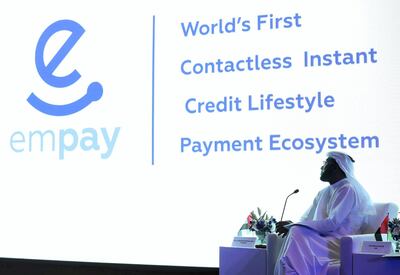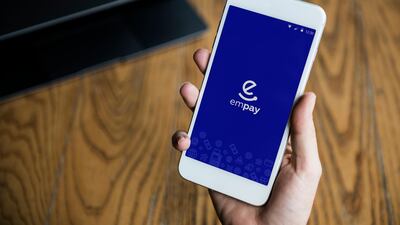The UAE’s first home-grown contactless mobile payment application, Empay, made its debut on Sunday, allowing UAE residents and citizens to pay for government and private sector services.
The app also provides a credit line based on a user’s transaction history.
Introduced by Emirates Payment Services, an initiative of Dubai Economy, Empay is intended to support the UAE’s transition to a digital economy, according to Ali Ibrahim, deputy director general of Dubai Economy and chairman and managing director of Empay.
The National looks at how the new application will work and potentially disrupt the UAE’s fast-moving contactless payment industry.
Who can use Empay?
UAE citizens and residents with a valid Emirates identity card.
How does Empay work?
Users can download the app free of charge and register using their mobile number, email address and a scan of their Emirates ID card. They can link their credit or debit cards to the Empay wallet by either scanning or entering the card details manually. Users also receive a prepaid digital card and can transfer funds to it to make payments through Empay. However, they need to be cautious as such transfers cannot be reversed.
Will Empay work outside the UAE?
If users are travelling outside the UAE, they can continue to use Empay to make their payments. The app allows customers to pay for government and private sector services, including licence renewals at the Dubai Economic Department, bill payments, food orders, school fee payments, international remittances and peer-to-peer micro payments.
Is Empay safe to use?
All critical information is encrypted, and no personal information is stored on the app or mobile device, according to Gigi Koshy, deputy chief executive and chief product officer of Empay.

“Your card information is never stored in the app or your phone ... this ensures that no one will be able to [gain] access [to] your card data from the Empay app,” he said.
Will Empay expand to other markets in the Middle East?
Authorities plan to introduce Empay across the Middle East and add new features to it, Mr Ibrahim said.
“The Empay wallet will be enabled not only for financial transactions but also for non-financial transactions, including identification and verification services that make it highly unique from other wallets.”
What is spurring the trend towards digital payments?
The Covid-19 pandemic has spurred the rapid adoption of digital payments worldwide to meet growing demand for contactless transactions, and the UAE is adapting at a pace that is quicker than experts expected.
Two thirds of people expect the country to become fully cashless by 2030, according to a poll by Standard Chartered.


